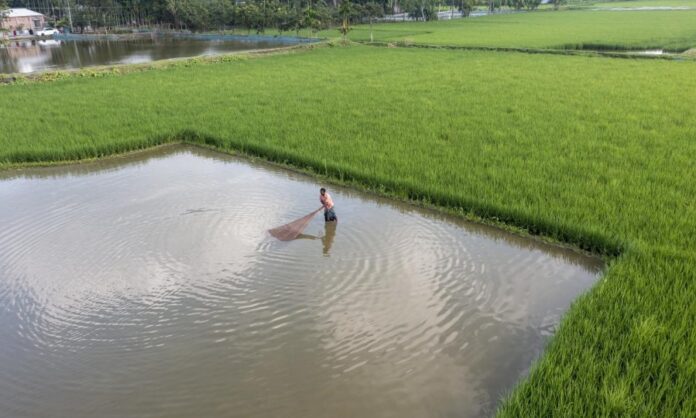A recent study by Maulu, et al., (2024) titled “Perceived effects of climate change on aquaculture production in Zambia: status, vulnerability factors, and adaptation strategies” published in Frontiers in Sustainable Food Systems, shows that aquaculture producers in Zambia, especially in certain regions, are highly vulnerable to climate change impacts.
“
Aquaculture producers in Zambia are highly vulnerable to climate change, facing increased costs and adaptation challenges due to financial constraints.– Maulu, et al., 2024
This study investigates the perceived impacts of climate change on aquaculture production in Zambia, identifying vulnerability factors and adaptation strategies used by aquaculture producers. The authors suggest that rising temperatures, altered rainfall patterns, cyclones, and disease outbreaks contribute to increased production costs. They highlight common adaptation strategies, including livelihood diversification and adjustments in fish growing periods and production facilities. However, adaptation is hindered by financial constraints, limited fish species diversity, and insufficient knowledge. To enhance sustainability, the study recommends promoting financial services, investing in research for diverse aquaculture species, and improving producer-specific extension programs.
How the study was conducted
The authors employed data from surveys and interviews with aquaculture producers. This helped in understanding their experiences and perceptions regarding climate change impacts. A representative sample of aquaculture producers was selected to ensure the findings could be generalized to a broader population. The authors analyzed the collected data to identify common themes and patterns. Statistical methods were used to quantify the extent of climate change impacts and the effectiveness of adaptation strategies. The findings were validated through cross-referencing with existing literature and expert opinions to ensure accuracy and reliability.
What the authors found
The authors found that aquaculture producers in Zambia, especially in certain regions, are highly vulnerable to climate change impacts, and many producers are not implementing adaptation measures due to financial limitations, species diversity constraints, and insufficient knowledge of alternative economic pursuits. In addition, the authors posit that the main strategies involve livelihood diversification and adjustments in fish cultivation periods and infrastructure.
Why is this important?
Sustainability of Aquaculture: Understanding the impacts of climate change on aquaculture helps in developing strategies to ensure the long-term sustainability of this vital food source.
Economic Stability: Aquaculture is a significant source of income for many communities. Addressing climate change impacts can help protect livelihoods and promote economic stability.
Food Security: As a key component of food security, ensuring the resilience of aquaculture to climate change is crucial for maintaining a stable food supply.
Policy Development: The study provides valuable insights for policymakers to create informed and effective policies that support aquaculture producers in adapting to climate change.
Research and Innovation: Highlighting the need for diverse aquaculture species and improved financial services encourages further research and innovation in the field.
What the authors recommended
- The authors argue that developing and providing access to financial services such as farm insurance can help aquaculture producers manage risks associated with climate change.
- The authors suggest that conducting research to diversify aquaculture species can help producers adapt to changing environmental conditions and reduce dependency on a limited number of species.
- The study advocates tailoring extension programs to the specific needs of aquaculture producers to improve their knowledge and capacity to implement effective adaptation strategies.
- The authors advocate encouraging and supporting producers to diversify their livelihoods to reduce their vulnerability to climate change impacts.
In conclusion, the study by Maulu et al. (2024) underscores the significant vulnerability of aquaculture producers in Zambia to the effects of climate change. Rising temperatures, shifting rainfall patterns, and increased disease outbreaks are elevating production costs and threatening livelihoods. Despite some adaptation efforts, financial limitations, lack of species diversity, and inadequate knowledge hinder effective responses. To bolster sustainability and resilience, it is crucial to enhance financial support, invest in research for diverse species, and tailor extension programs to meet the specific needs of producers. Addressing these challenges not only supports economic stability and food security but also paves the way for more robust and adaptive aquaculture practices in the face of a changing climate.
















 The African Research (AR) Index is a comprehensive scholarly directory and database focused explicitly on journal publishers that publish and disseminate African research.
The African Research (AR) Index is a comprehensive scholarly directory and database focused explicitly on journal publishers that publish and disseminate African research.

